The internet has come a long way since its humble beginnings, from a small network meant to share research to a global phenomenon that shapes the way we live, work, and play. Along the way, certain websites have left an indelible mark on the web, becoming pillars of digital innovation and cultural evolution.
In this post, we’re going to take a walk down memory lane, revisiting 15 noteworthy websites that didn’t just shape the internet but also changed our everyday lives. Whether they revolutionized how we communicate, shop, or entertain ourselves, these websites have left a lasting legacy on the online world.
45 Interesting Websites You Should Know (And Bookmark)
Internet is a place of anything and everything. No matter which walks of life you belong to, there... Read more
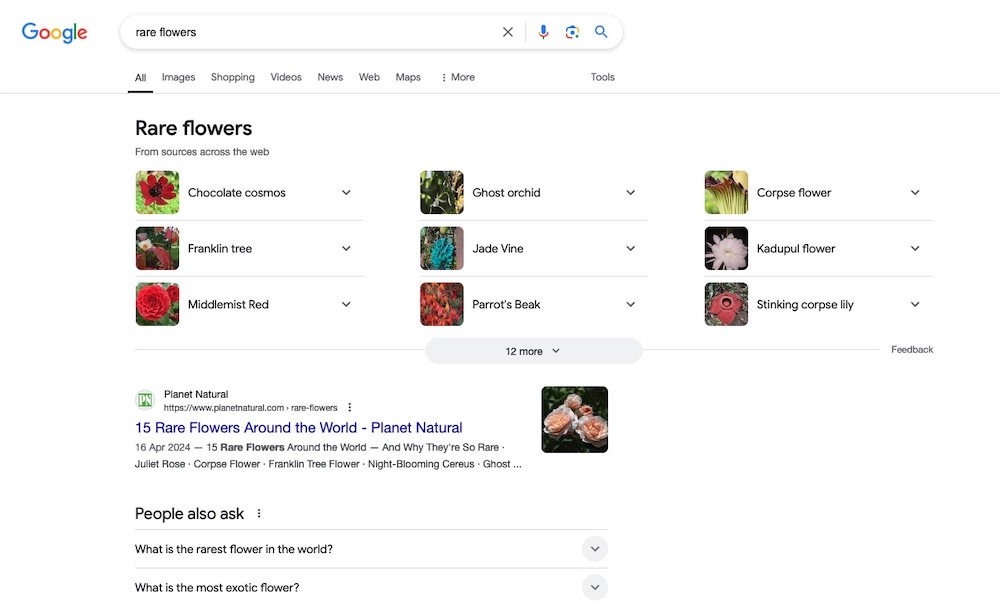
- Founded in: 1998
- Founders: Larry Page, Sergey Brin
- Alternatives: Bing, DuckDuckGo, Yahoo
Ah, Google! Where would we be without it? Can you even imagine a world where you can’t “Google” something? Google launched in 1998, and since then, it has become the go-to search engine for everything. Whether you need to know the capital of a distant country, the latest celebrity gossip, or the definition of some obscure word, chances are you turn to Google first.
What made Google so revolutionary wasn’t just the fact that it indexed the web better than other search engines at the time (remember AltaVista or Ask Jeeves?). It was how Google’s algorithms evolved, learning how to rank websites based on relevance and quality rather than spammy tactics or paid placement. Over time, this made finding information online quicker, more accurate, and accessible to everyone.
Beyond search, Google also branched out into tools that have become essential in everyday life – think Gmail, Google Maps, and Google Docs. Today, it’s not just a search engine; it’s practically an internet ecosystem.
Amazon
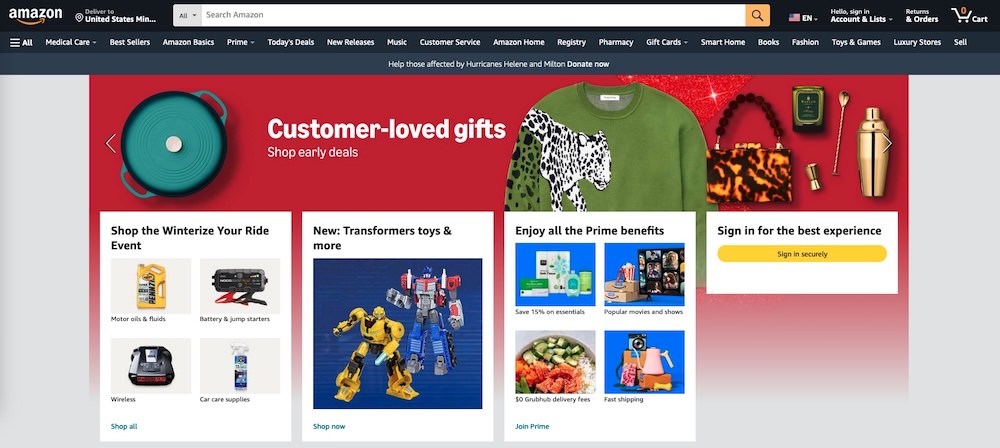
- Founded in: 1994
- Founder: Jeff Bezos
- Alternatives: eBay, Walmart, Alibaba
What started as a humble online bookstore in 1994 has turned into an unstoppable e-commerce giant. Amazon has completely transformed how we shop. Seriously, who among us hasn’t relied on Amazon for a last-minute gift or some random kitchen gadget we didn’t know we needed?
At first, Amazon was all about books, but it quickly expanded to include everything from electronics to clothing, groceries, and even streaming services. It also pioneered the idea of fast, reliable delivery through Amazon Prime, which has now spoiled us all with two-day (or even same-day) shipping.
But beyond convenience, Amazon changed the internet by showing that an online marketplace could be a one-stop-shop for just about anything. It also paved the way for businesses of all sizes to reach a global audience, thanks to its vast infrastructure and fulfillment services. And, of course, we can’t forget about Amazon Web Services (AWS), which powers a huge chunk of the internet’s backend. Whether we like it or not, Amazon has its fingerprints all over the web.
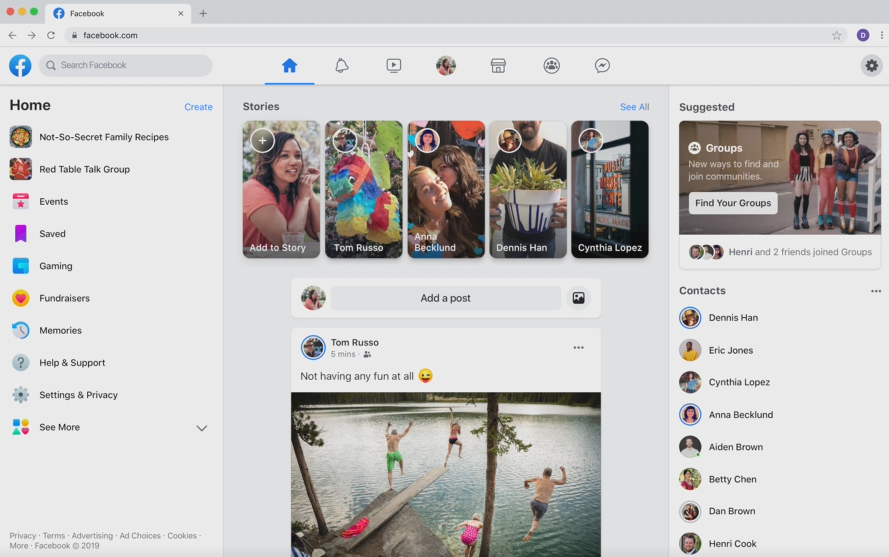
- Founded in: 2004
- Founders: Mark Zuckerberg, Eduardo Saverin, Andrew McCollum, Dustin Moskovitz, Chris Hughes
- Alternatives: Instagram, TikTok, Twitter (X)
Facebook, launched in 2004, started as a small social networking site for college students and grew into the behemoth that connects billions of people around the globe. It revolutionized the way we communicate, share information, and stay connected with friends and family – even those we haven’t seen since high school.
Facebook didn’t just change the internet; it practically invented the concept of social media as we know it today. Status updates, photo sharing, “likes,” and comments are all things we now take for granted but were groundbreaking when Facebook introduced them. It also became a powerful platform for businesses and advertisers, changing the way companies reach and interact with customers.
Wikipedia
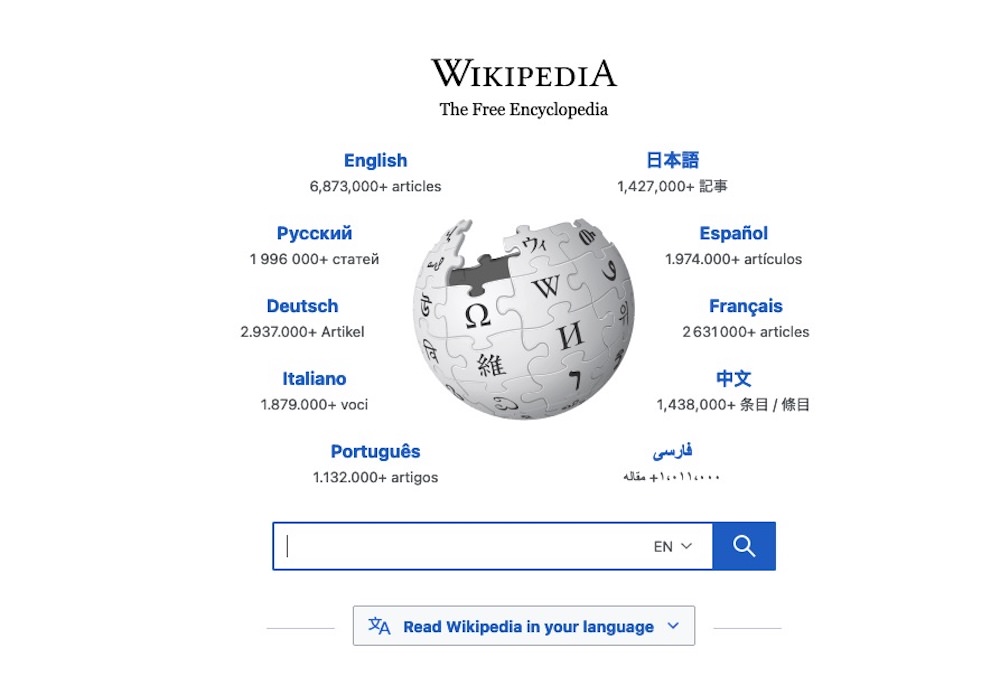
- Founded in: 2001
- Founders: Jimmy Wales, Larry Sanger
- Alternatives: Britannica, Scholarpedia, Baidu Baike
Launched in 2001, Wikipedia was the internet’s bold experiment in crowdsourcing information, and honestly, it’s hard to imagine the web without it now. Wikipedia is the world’s largest free online encyclopedia, built and maintained by volunteers from all corners of the globe. What made it revolutionary was the idea that anyone could edit its pages, allowing for constant updates and a wealth of information on an unimaginable range of topics.
Of course, that also came with some skepticism at first. After all, how reliable could something be if just anyone could contribute? But Wikipedia’s community-driven model and moderation systems quickly found a balance, and now it’s one of the most trusted and visited sites on the internet. From students cramming for exams to casual browsers looking to learn something new, Wikipedia became the go-to resource for quick, detailed information.
Not only did it democratize access to knowledge, but it also embodied the internet’s potential as a place for collaborative learning. It’s hard to overstate just how much of an impact Wikipedia has had, offering free information on everything from scientific discoveries to niche pop culture references.
YouTube
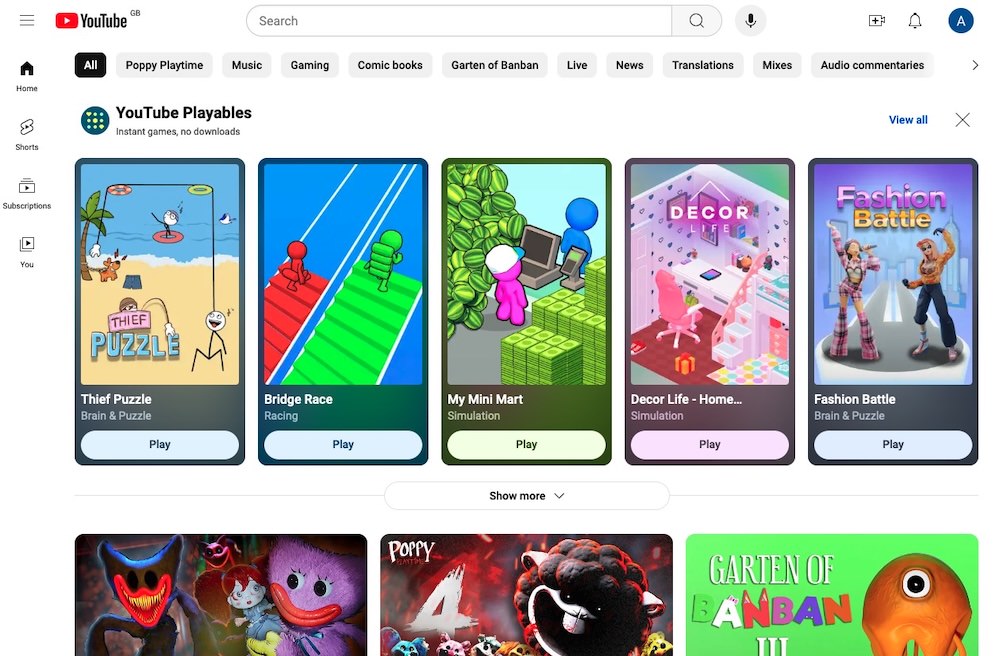
- Founded in: 2005
- Founders: Steve Chen, Chad Hurley, Jawed Karim
- Alternatives: Vimeo, Dailymotion, Twitch
YouTube, launched in 2005, turned the internet into a place where video wasn’t just consumed – it was created by anyone with a camera and an internet connection. What started as a platform to share personal videos (like that infamous “Me at the Zoo” clip) quickly evolved into a cultural powerhouse, transforming entertainment, education, and even business.
Before YouTube, the idea of becoming famous from your bedroom was unheard of. But then, suddenly, you had regular people becoming celebrities, building careers as “YouTubers” through vlogging, gaming, or creating educational content. YouTube became the place where viral videos like Charlie Bit My Finger or Gangnam Style took the world by storm.
It wasn’t just about entertainment either. YouTube made it easier than ever to learn new skills, with how-to videos and tutorials on everything from fixing your sink to coding. And of course, it became a major platform for musicians, artists, and brands to reach a global audience.
With over 2 billion users worldwide, YouTube continues to shape how we consume media and interact online. It’s given everyone – from big corporations to indie creators – a voice, and that has been a game-changer for the internet.
X (formerly Twitter)
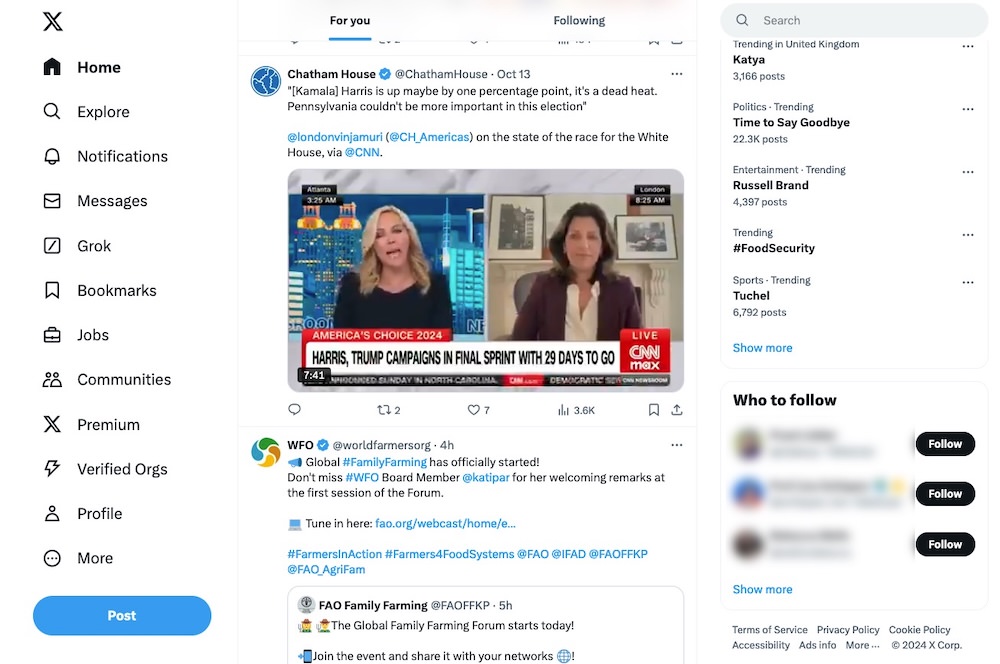
- Founded in: 2006 (as Twitter), rebranded to X in 2023
- Founders: Jack Dorsey, Noah Glass, Biz Stone, Evan Williams
- Alternatives: Mastodon, Bluesky, Threads
Originally launched in 2006 as Twitter, the platform revolutionized how we share information in quick, digestible bites – first with 140 characters, and later expanded to 280. Over time, it became a global hub for real-time conversations, news, and trends. You could live-tweet events, engage in heated debates, or just join the latest meme craze.
But in 2022, the platform entered a new chapter. Twitter was acquired by Elon Musk, and in 2023, it rebranded to X. Musk’s vision for X is to turn it into a “super app” that goes beyond just microblogging, potentially integrating payments, shopping, and more into the platform. While it’s still evolving, X aims to redefine how users interact with each other and the digital economy.
Though it remains a powerful space for real-time conversations, the rebranding signals that X could be on the verge of transforming yet again – this time into something much more expansive. Whether it retains the same spirit of the original Twitter or becomes something entirely different is something we’ll have to wait and see.
eBay
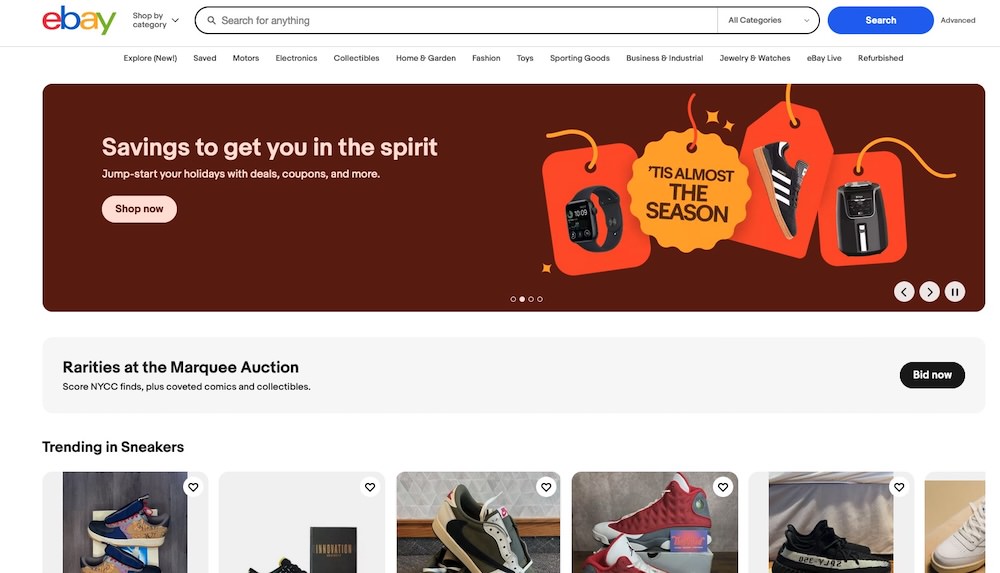
- Founded in: 1995
- Founder: Pierre Omidyar
- Alternatives: Craigslist, Facebook Marketplace, Etsy
eBay, founded in 1995, was one of the first platforms to make online buying and selling between individuals not only possible but easy. What started as an online auction site (famously beginning with the sale of a broken laser pointer) quickly grew into a global marketplace where you could find everything from rare collectibles to everyday household items.
eBay changed the game by empowering individuals to sell their items directly to buyers without the need for a traditional storefront. Suddenly, anyone with internet access could become an entrepreneur. This peer-to-peer commerce model paved the way for the gig economy and online marketplaces we see today. Whether you’re hunting for a vintage toy from your childhood or selling that unwanted gadget, eBay created a platform that made online commerce feel personal and accessible.
Although the site now offers fixed-price sales alongside its traditional auctions, its original auction-style format made it stand out. eBay’s success showed the world that e-commerce wasn’t just for big businesses – it was for everyone.
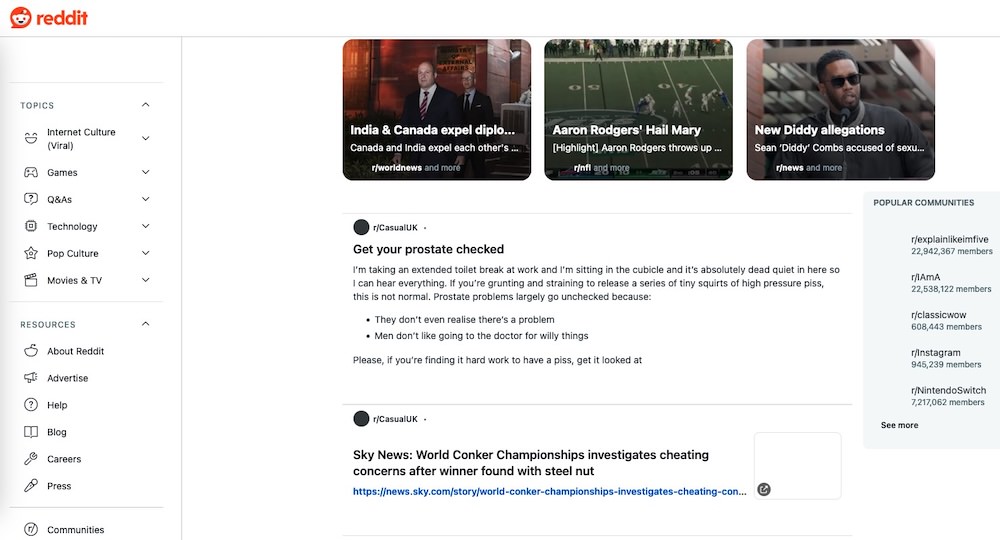
- Founded in: 2005
- Founders: Steve Huffman, Alexis Ohanian
- Alternatives: Voat (defunct), Quora, 4chan
Reddit, launched in 2005, calls itself “the front page of the internet” – and for good reason. Reddit is a massive collection of forums where users can share news, content, and discussions on just about every topic under the sun. Whether you’re into gaming, science, cooking, or just want to scroll through some funny memes, Reddit has a community (or “subreddit”) for you.
What makes Reddit so impactful is how it has empowered online communities. It’s a place where niche interests can find a voice, where experts and enthusiasts discuss everything from obscure hobbies to breaking news. And while it may not have the glitzy interface of some social networks, its democratic system of upvoting and downvoting ensures that the most popular (or helpful) content rises to the top.
Reddit has been the birthplace of viral trends, internet memes, and even major movements like “Ask Me Anything” (AMA) sessions with celebrities, politicians, and everyday people sharing incredible stories. With millions of users engaging in passionate debates or sharing knowledge, Reddit shaped the internet into a space where community-driven content is king.
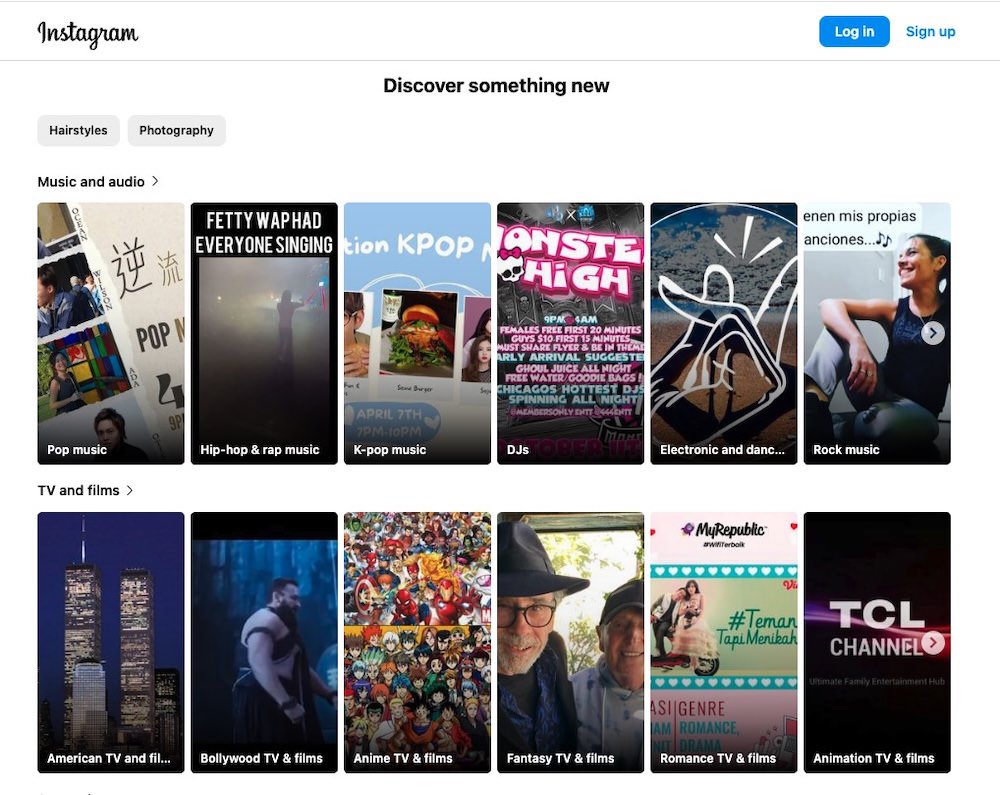
- Founded in: 2010
- Founders: Kevin Systrom, Mike Krieger
- Alternatives: TikTok, Snapchat, Pinterest
Instagram launched in 2010, and it was hard to predict just how massive it would become. What began as a simple photo-sharing app quickly turned into a cultural juggernaut that completely changed how we interact with visuals online. Instagram wasn’t just about snapping photos; it was about creating a curated visual experience – whether through filters, stories, or later, the addition of videos and reels.
Instagram played a significant role in ushering in the age of social media influencers. Suddenly, individuals with a knack for good lighting and creative content could amass millions of followers and partner with brands to promote everything from beauty products to lifestyle choices. It became not only a platform for self-expression but also a major marketing tool, especially for younger audiences.
The app’s focus on visuals also gave rise to the term “Instagrammable,” influencing everything from fashion trends to travel destinations as people began seeking out picture-perfect moments to share with their followers. And let’s not forget its role in reshaping online shopping, with brands seamlessly integrating e-commerce into their Instagram profiles.
Acquired by Facebook (now Meta) in 2012, Instagram remains a central platform for visual storytelling and social interaction, consistently evolving with features like Stories, IGTV, and Reels to compete with the likes of TikTok. It turned the internet into a place where visuals are just as important – if not more – than words.

- Founded in: 2010
- Founders: Ben Silbermann, Paul Sciarra, Evan Sharp
- Alternatives: Instagram, We Heart It, Tumblr
Pinterest, launched in 2010, quickly became the go-to website for inspiration, allowing users to “pin” images, articles, and ideas to digital boards. Whether you’re planning a wedding, redesigning your living room, or simply looking for creative recipes, Pinterest offered a unique way to collect and organize ideas visually.
What sets Pinterest apart from other platforms is how it blends social media and search engine functionality. It’s not just about following people or brands; it’s about discovering new ideas through its visual search engine. Users can create boards based on their interests and visually curate them into categories like fashion, home decor, travel, or food. It’s like having a personalized magazine at your fingertips.
Pinterest also changed the game for businesses, especially in industries like design, crafts, and lifestyle, by allowing brands to reach users during their “idea-gathering” phase. From bloggers to big-name companies, Pinterest became an essential tool for driving traffic and inspiring purchase decisions.
In short, Pinterest didn’t just change how people use the internet for inspiration – it became a digital mood board for millions, turning casual browsing into an endless source of creativity and ideas.
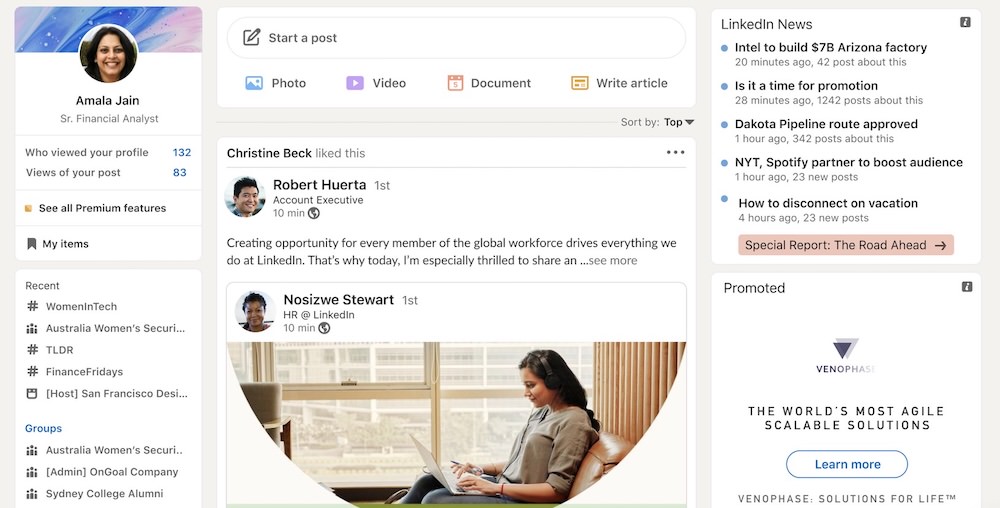
- Founded in: 2003
- Founders: Reid Hoffman, Allen Blue, Konstantin Guericke, Eric Ly, Jean-Luc Vaillant
- Alternatives: Xing, Indeed, Glassdoor
LinkedIn founded in 2003, has grown into the world’s largest professional networking site, fundamentally changing how we manage our careers and professional relationships online. What started as a simple platform to connect with colleagues and job recruiters has evolved into an essential tool for professionals in nearly every industry.
LinkedIn brought the business world to the internet in a way that other social networks couldn’t. It allowed users to create detailed profiles that served as digital resumes, highlighting their work experience, skills, and achievements. Beyond that, it became a hub for industry news, thought leadership, and professional development. People could join industry groups, participate in discussions, and even publish articles to establish themselves as experts in their fields.
One of LinkedIn’s most significant impacts has been on the job search and recruitment process. It made it easier for recruiters to find candidates and for job seekers to network, apply, and get noticed by potential employers. Over time, LinkedIn introduced features like endorsements, skill assessments, and job-matching algorithms, making it a powerful career tool for millions.
Whether you’re looking for your next career move or trying to build your professional network, LinkedIn transformed the way the world approaches work and networking in the digital age.
Yahoo!
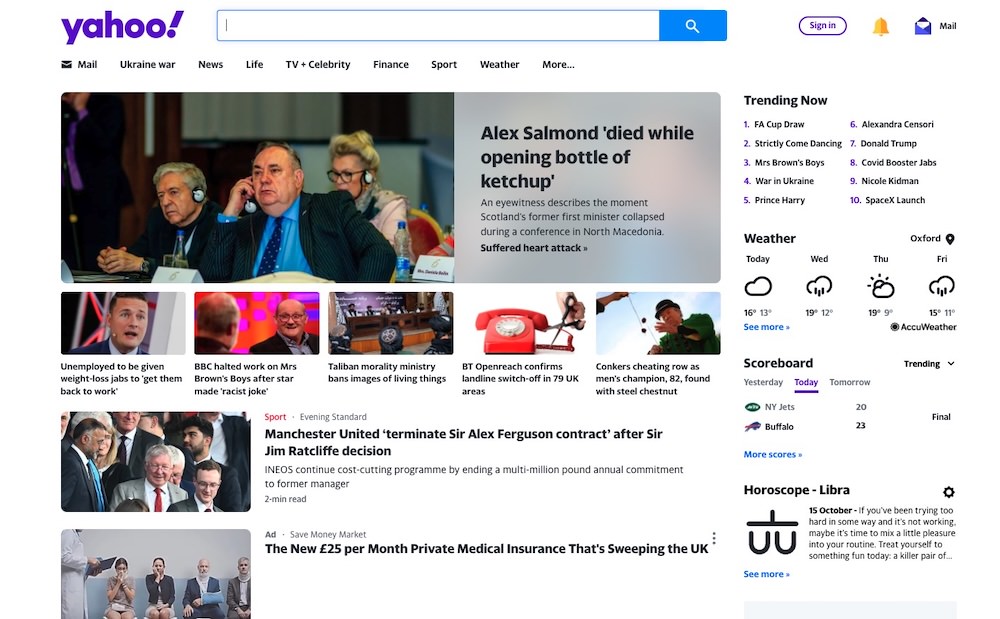
- Founded in: 1994
- Founders: Jerry Yang, David Filo
- Alternatives: Google, MSN, AOL
Before Google dominated the search engine world, Yahoo! was the internet’s front door. Founded in 1994, Yahoo! quickly became one of the most visited websites globally, offering a suite of services like email, news, finance, and search. It was many people’s first introduction to the internet, and for a long time, it was the place to go for almost everything online.
Yahoo! wasn’t just a search engine; it was a portal to curated content. From Yahoo! News to Yahoo! Finance, it was a hub for people looking for quick access to information, weather updates, sports scores, or the latest trends. Its email service, Yahoo Mail, was also one of the first widely adopted free email providers, which millions of users still rely on today.
While Yahoo’s influence has faded in the shadow of Google’s rise, its contribution to the early days of the internet cannot be understated. Yahoo! helped millions of people navigate the web in its infancy and set the stage for how online portals could integrate various services under one umbrella.
PayPal
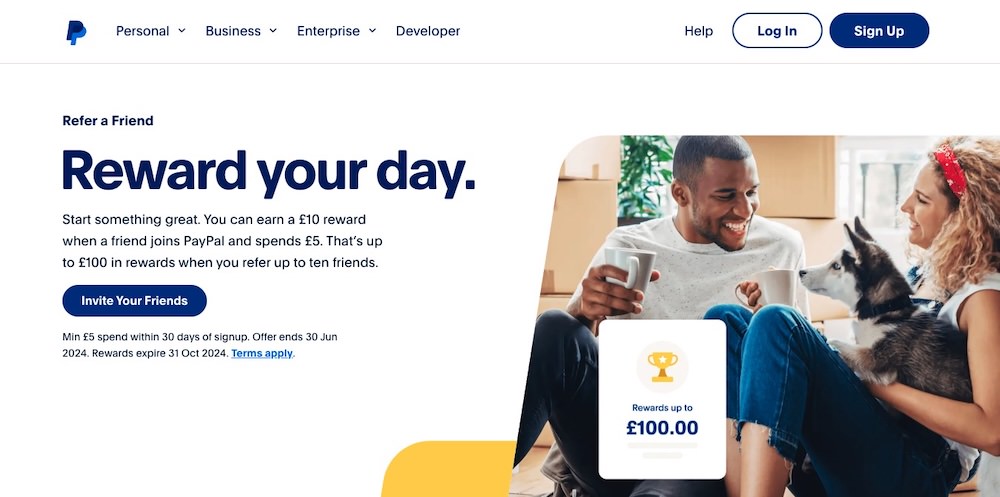
- Founded in: 1998
- Founders: Max Levchin, Peter Thiel, Luke Nosek, Elon Musk
- Alternatives: Stripe, Square, Venmo, Skrill
Founded in 1998, PayPal revolutionized online payments and made e-commerce safer and more accessible for everyone. It was one of the first platforms to offer a secure and convenient way to transfer money between individuals and businesses without sharing sensitive financial information like credit card numbers. This was a game-changer for both buyers and sellers, especially during the rise of eBay, where PayPal became the preferred method of payment.
PayPal’s simplicity and security helped build trust in online transactions, which was crucial in the early days of e-commerce when many people were still wary of shopping online. The platform allowed users to link their bank accounts or credit cards, making it easy to send and receive money with just an email address.
Beyond e-commerce, PayPal has become a key player in the digital payments space, expanding to include services like peer-to-peer payments (via Venmo) and small business loans. Its impact has been felt globally, with millions of users and businesses relying on PayPal to facilitate everyday transactions.
By making online payments easier and more secure, PayPalplayed a pivotal role in fueling the growth of the internet economy.
Blogger
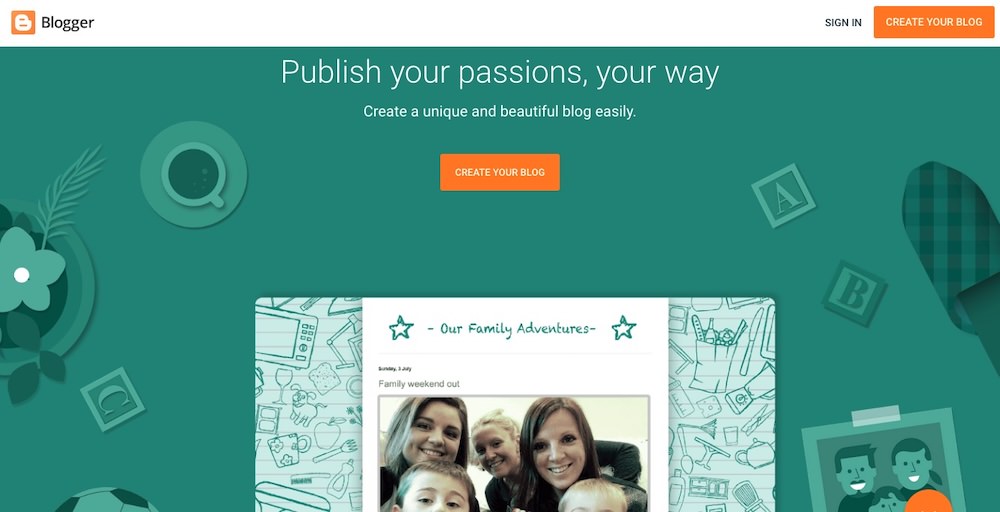
- Founded in: 1999
- Founders: Evan Williams, Meg Hourihan
- Alternatives: WordPress, Medium, Tumblr
Blogger, launched in 1999, was one of the first major platforms to bring blogging to the masses. Before Blogger, the idea of publishing your thoughts, stories, or expertise online required some technical know-how. Blogger changed all that by offering a simple, user-friendly interface that allowed anyone with an internet connection to start their own blog without needing coding skills.
Blogging became a cornerstone of internet culture, enabling people to share their passions, connect with others, and even build entire careers through their blogs. From personal diaries to niche blogs on travel, food, tech, and everything in between, Blogger democratized content creation in a way that paved the way for the creator economy we see today.
Google acquired Blogger in 2003, which further boosted its visibility and integration with other services like Google AdSense, enabling bloggers to monetize their content. While platforms like WordPress have since risen in popularity, Blogger’s contribution to the early web era and its role in the blogging revolution is undeniable.
WordPress
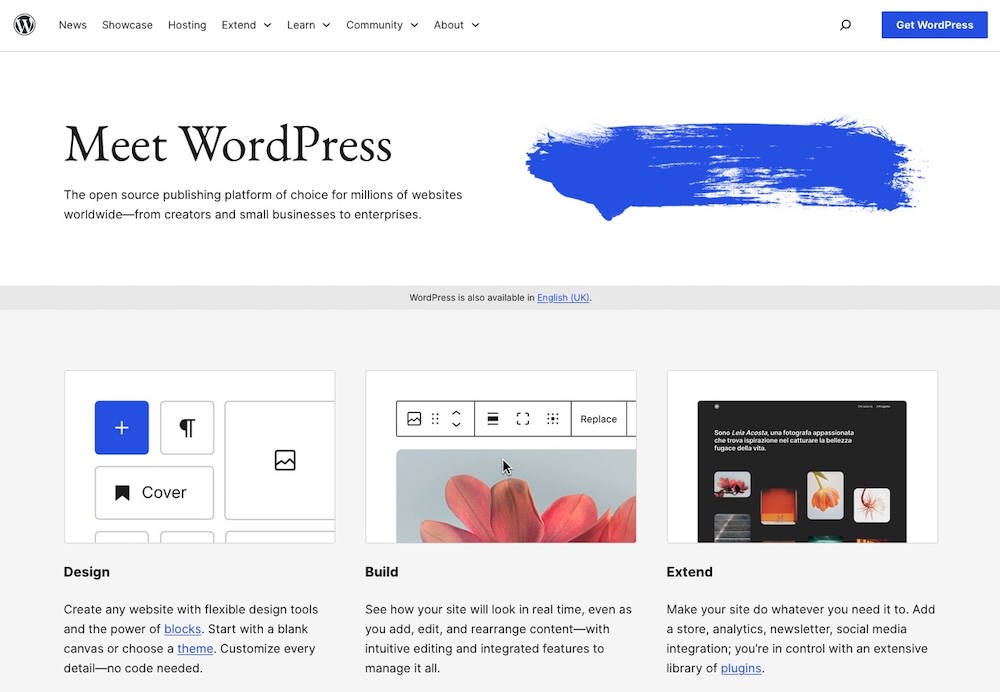
- Founded in: 2003
- Founders: Matt Mullenweg, Mike Little
- Alternatives: Wix, Squarespace, Joomla
Launched in 2003, WordPress took the torch from earlier platforms like Blogger and became the go-to content management system (CMS) for both bloggers and businesses. While it started as a simple blogging tool, WordPress quickly grew into a powerful website-building platform that now powers over 40% of all websites on the internet.
What made WordPress revolutionary was its flexibility. Users could build anything from personal blogs to full-fledged e-commerce stores and corporate websites. Its open-source nature allowed developers to create countless plugins and themes, making it highly customizable for different needs. Unlike other platforms that offered limited functionality, WordPress gave users full control over their websites.
The platform also played a significant role in the rise of DIY website creation. You no longer needed to hire a web developer or know how to code to build a professional-looking site. This accessibility empowered millions of people and businesses to create their online presence, fueling the growth of the web as we know it today.
WordPress continues to be a leader in the digital space, thanks to its adaptability and the massive community of developers and users who contribute to its evolution.
And there we have it – the 15 websites that truly changed the internet! Each of these platforms, in its own way, left a lasting mark on how we interact, shop, share, and create online.

